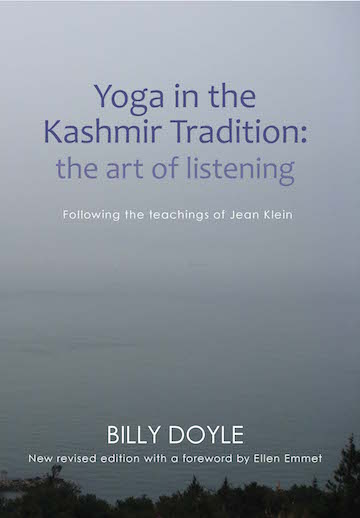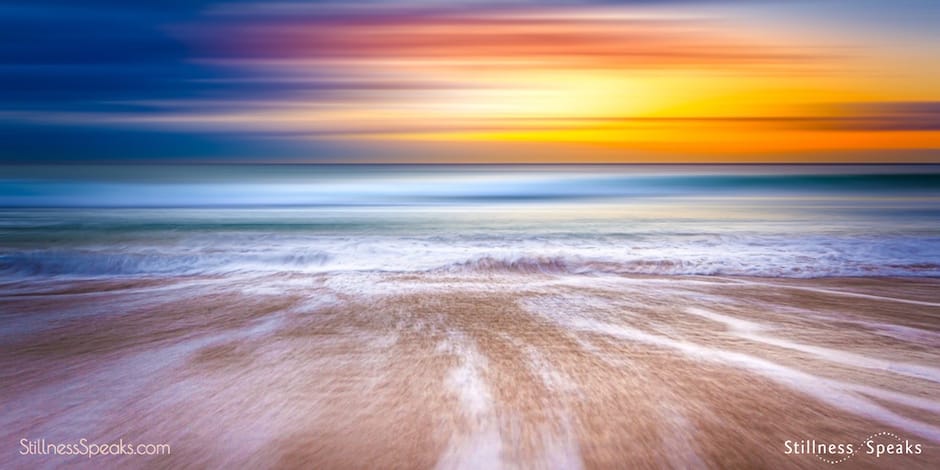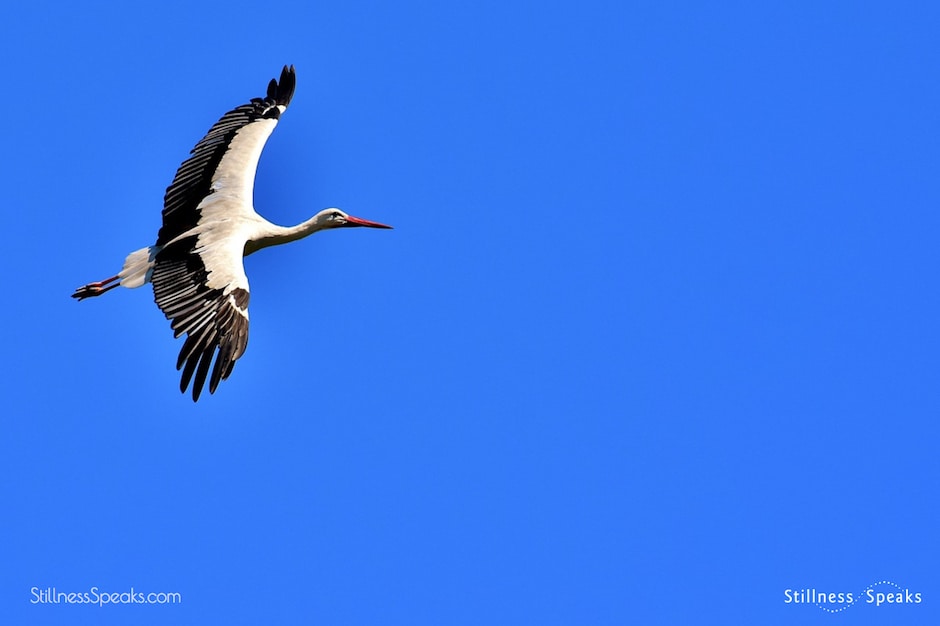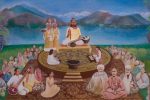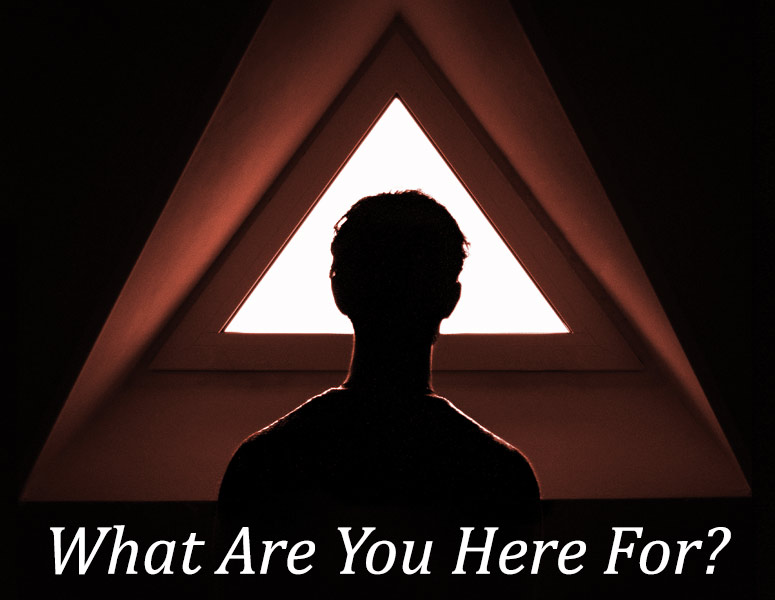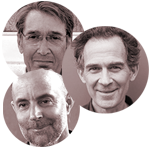Yoga In The Kashmir Tradition: “… In pure perception we are open to the sense of wonder. More profoundly, when the senses are no longer dominated by mental function and the idea of a separate perceiver, objects are no longer objects; they are extensions of ourselves, expressions of silence …” ~ Billy Doyle
“… The one thing in this world you must never forget to do. If you forget everything else and not this, there’s nothing to worry about, but if you remember everything else and forget this, then you will have done nothing in your life …” ~ Rumi
Indeed, Rumi’s utterances over the last ~30 years of his life are ultimately about this “one thing” : realizing your True Nature … and the recent (last 3-4 decades) growth of nonduality spiritual teachers on the one hand is a welcome development because they are – in the end – bringing awareness to Rumi’s “one thing” and making it more prevalent (maybe even “acceptable”) within many, if not all, “segments of humanity/society” … BUT on the other hand there is the natural risk of dilution and its troubling ramifications …
Of course, this matter – or the risk – of “dilution” has become exponentially “multiplied” due to the internet being such an essential part of life … and it seemingly applies to different “aspects (sub traditions?)” of spirituality such as Mindfulness.
David Loy, a Zen master, and Ron Purser eloquently argue about the same dilution issue in the context of Mindfulness: “… the rush to secularize and commodify mindfulness into a marketable technique may be leading to an unfortunate denaturing of this ancient practice …” … in their post titled: Beyond McMindfulness.
In the context of nonduality, Ellen Emmet … equally eloquently says: “… As the internet becomes the shrine and anyone who has had a singular awakening experience becomes the guru, the risk arises that the teaching will be watered down or even deadened. …” … {consequently} … “… The living tradition, consisting of the direct transmission of truth and the means to establish oneself there, and carried down through the generations by a lineage of sages, is often discarded or ignored, leaving many frustrated and confused before long …”
Above excerpt is from her Foreword to Billy Doyle’s 2019 book: Yoga In The Kashmir Tradition: The Art Of Listening – Following The Teachings of Jean Klein … which we will be exploring in a multi part series starting with this post – part 1 … which offers Ellen’s Foreword and Billy’s Introduction to set the stage …
{All italicized text below is from Billy’s book and is published here with the publisher New Sarum Press’ generous permission. Scroll to the bottom for a free downloadable Table of Contents.}
So, here is Ellen continuing her Foreword …
With some exceptions, few or no means are provided to investigate the existing or remaining beliefs in separation that continue to rule our lives after a moment of understanding and that seem to obscure the shining of our true nature. Furthermore, many contemporary non-dual offerings misunderstand and therefore neglect the importance of including the body and the realm of feeling and perception in the investigation of such beliefs and conditioning.
In this context, Billy Doyle’s Yoga in the Kashmir Tradition, updated and fleshed out in this second edition, is a great relief and a true gem. It is first and foremost a bow to his teacher, Jean Klein, paying homage to his lineage and the tradition of direct transmission and placing Billy’s own teaching within that sacred current.
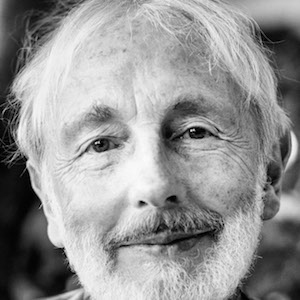
With the pedagogical sensitivity that characterises his yoga sessions and retreats, Billy then guides us into a sequence of short and exquisite experiential explorations of our direct perceptual and tactile experience.
…
~ Ellen Emmet, 2019
Yoga In The Kashmir Tradition – Introduction
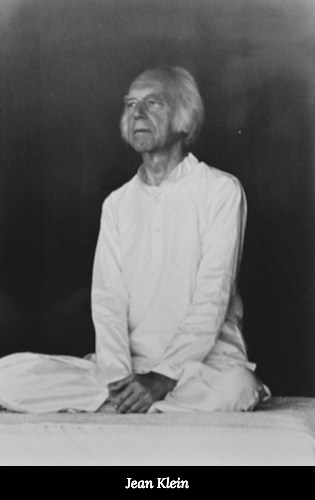
Jean Klein was a master of Advaita Vedanta (non-duality) in the tradition of Ramana Maharshi and Shri Atmananda Krishna Menon; however, he had his own distinctive and unique approach.
…
Here I will be focusing on his teachings regarding yoga, but as the whole sphere of his approach, be it self-enquiry, meditation or body work, was totally integrated, so these different aspects are intertwined through the book.
Jean had studied medicine and was a musicologist. In 1954 he left France and went to India for three years; it was at Bangalore University where he was studying that Jean met his guru, Pandiji, who was a professor of Sanskrit. His yoga teacher was Krishnamacharya of Madras, but whilst Jean was living in Bangalore he also met a yogi, Dibianandapuri, who had lived a long time in Kashmir. It was Dibianandapuri who introduced Jean to the Kashmir teachings and confirmed his understanding that the real body was the energy body and not the physical body. He showed him how all the yoga postures could be carried out on the subtle level independently of the physical body.
The nature of Jean’s teaching when he returned to Europe was focused on the questions: What is our real nature? Who am I? Yoga was part of this enquiry. Even before his visit to India, Jean had a particular interest in the relationship between body function and psychology. Most teachers tend either to stress self-enquiry to the exclusion of body work or focus on body work with little regard for self-enquiry, but with Jean there was a marriage of approaches.
Jean explains in the following two paragraphs why the body work is important:
About a year after I returned from India I found it necessary to expand the teaching to the psychosomatic level. It became apparent, through meeting people, that identification with what we are not is confirmed and reinforced by contraction on the psychosomatic level. The I-concept is only a contraction on the level of the body-mind. It has no more reality than a bad habit. It is a defence against being nobody.
In getting to know the body-mind, one can discover more clearly the nature of identification, and so let it go. The relaxed body is a relaxed mind. In a relaxed body and mind you are open to receiving, available, welcoming, open to the openness. The relaxed, light, energetic, sattvic body-mind is a near expression of our real nature. It is almost impossible for a conditioned body-mind to be receptive to truth, open to grace. It can happen that truth pierces through all conditioning, since the insight into our true nature ultimately has nothing to do with the body or the mind. But it is exceedingly rare. My teaching also on the level of the body was only to make discrimination more likely, to help more of my friends be available to global insight.
Jean Klein, Transmission of the Flame
We might say, and understand theoretically, that we are not the body, senses and mind since they are simply objects in awareness. But just to say that I’m not the body remains an intellectual idea, an abstraction; do we really know what this body is? It is the contraction and defences on the level of the body that reinforce our identification with a particular body-mind. The body is in many ways an intricate defence mechanism which maintains our self-image. It is only by exploring the body that we free it from its habitual patterns and discover the real body. This exploration is the art of listening; of course this listening is not restricted to the ears—all the senses are involved, it is our total receptivity. In freeing the body from restriction and coming to the expanded body, we have a fore-feeling of our real nature, our globality. The understanding of our real nature takes place on every level of our being, even the cells of our body are affected in the transformation—otherwise the transformation remains partial.
This exploration does not involve a dictatorship over oneself; it is not a discipline that implies compulsion and conflict. The understanding comes through discernment.
~ Billy Doyle
Stay tuned for more … as we continue our deep dive into Billy Doyle’s Yoga In The Kashmir Tradition … in subsequent posts …. where he talks about Advaita Vedanta, The Art of Listening, Listening to the Body, and Meditation …
And click here for a FREE downloadable copy of the Table of Contents, graciously and generously made available by the publisher New Sarum Press.
All italicized text above (except for the Go Fund Me related text) is from Yoga In The Kashmir Tradition: The Art Of Listening – Following The Teachings of Jean Klein and is published here with the publisher New Sarum Press’ generous permission.
And, here’s a gentle reminder to help those in times of extreme need …
Go Fund Me continues to be a platform (amongst many others) for exercising – and deepening – our kindness and compassion. To this end, we have selected a few “pertinent to this time” campaigns that bring relief … for animals during natural disaster (like the llming IDA Hurricane) … for a family that lost the father – a marine in Afghanistan – while expecting a new baby … for small businesses … for restaurant workers – the world over …
We are all facing financial challenges but IF your situation allows you to donate and help then please do so …
Of course, there are many more worthy and noble efforts – the ones highlighted here are simply suggestions that may inspire you to donate to whatever effort you are drawn to …
Also, … here’s a GoFundMe blog post Fundraising for Coronavirus Relief: How You Can Help the Fight that offers a very comprehensive map for the COVID relief efforts including how you can help, what to give to, and lots more … We are supporting some of these campaigns personally and also as Stillness Speaks (through donations).
THANK YOU!
And, may you recognize the profound importance of “the one thing” … and …
May you remain safe and healthy as you navigate these unsettling times.

